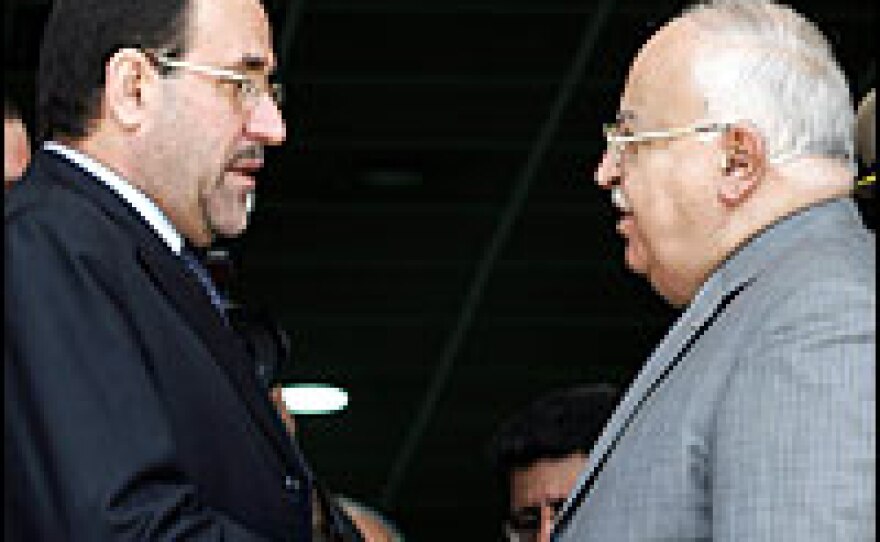President Bush on Wednesday renewed his support for Iraqi Prime Minister Nouri al-Maliki and his commitment to remain in Iraq.
"Prime Minister Maliki's a good guy, a good man with a difficult job, and I support him," Mr. Bush told veterans in Kansas City, Mo. "And it's not up to the politicians in Washington, D.C. to say whether he will remain in his position. It is up to the Iraqi people who now live in a democracy and not a dictatorship."
On Tuesday, President Bush had appeared to back off his support for the al-Maliki government, saying he was frustrated with Iraqi leaders' inability to bridge political divisions. Meanwhile, Sen. Carl Levin (D-MI) said al-Maliki, a Shiite, should be ousted and replaced with a less sectarian leader.
That brought a rebuke from al-Maliki, who said no one has the right to put timetables on his democratically elected government. He blamed the U.S. presidential campaign for the criticism.
"No one has the right to place timetables on the Iraq government. It was elected by its people," he said at a Wednesday news conference in Damascus, Syria.
On Wednesday, President Bush said U.S. troops are making progress in Iraq and will stand their ground.
"Our troops are seeing the progress that is being made on the ground," Mr. Bush said. "And as they take the initiative from the enemy, they have a question: `Will their elected leaders in Washington pull the rug out from under them just as they are gaining momentum and changing the dynamic on the ground in Iraq? Here's my answer: We'll support our troops, we'll support our commanders, and we will give them everything they need to succeed."
The president reminded veterans of the Pearl Harbor attack and the other wars that have spawned democracies in the Far East. He compared those wars to the U.S.-led "war on terror," saying they are same because they all involved "ideological struggles."
"We are still in the early hours of the current ideological struggle, but we know how the others ended, and that knowledge helps guide our efforts today," the president said.
"The ideals and interests that led America to help the Japanese turn defeat into democracy are the same that lead us to remain engaged in Afghanistan and Iraq," Mr. Bush said. "The defense strategy that refused to hand the South Koreans over to a totalitarian neighbor helped raise up an Asian Tiger that is a model for developing countries across the world, including the Middle East."
Mr. Bush characterized al-Maliki as an important friend and ally and stressed that the U.S. must be steadfast in its support for Iraq so that it does not become a terrorist stronghold. In doing so, he likened the situation in Iraq to Vietnam, saying that the abrupt pullout of U.S. forces there led to the slaughter of many Vietnamese.
In Damascus, al-Maliki said his visit to Syria has also sparked criticism from U.S. officials.
"Those who make such statements are bothered by our visit to Syria. We will pay no attention. We care for our people and our constitution and can find friends elsewhere," al-Maliki said.
The Iraqi prime minister is in Damascus for a three-day meeting with Syrian leaders. He and U.S. officials have criticized Syria for being lax on border security, saying that has allowed foreign fighters to come into Iraq and bolster the insurgency.
Al-Maliki is meeting with Syrian leaders in an attempt to deal with the problem. A spokesman said al-Maliki and Syrian Prime Minister Mohammed Naji Ottri will also discuss economic issues.
U.S. Ambassador to Iraq Ryan Crocker said this week that he was disappointed and frustrated by the lack of political progress by al-Maliki's government. Crocker said the Iraqis themselves and Iraqi leaders were also frustrated.
The exchanges come just a few weeks before Crocker and the U.S. commander in Iraq, Gen. David Petraeus, are to report to Congress on military and political progress in Iraq.
The two are expected to point to some signs of military progress in Iraq. But the political situation in Iraq remains fractured, with wide distrust between Shiite and Sunni factions and no progress by al-Maliki's government on key issues.
Bush's statement on Tuesday was a marked change in tone from his endorsement of al-Maliki in November 2006 at a meeting in Jordan as "the right guy for Iraq."
In recent months, Bush has continually prodded al-Maliki to do more to forge political reconciliation before the temporary U.S. military buildup ends. But his statements Tuesday were the sharpest he has made about whether the Iraqi prime minister will survive.
"The fundamental question is, Will the government respond to the demands of the people?" Bush said. "And, if the government doesn't demand - or respond to the demands of the people, they will replace the government. That's up to the Iraqis to make that decision, not American politicians."
Al-Maliki has faced numerous defections from his ruling coalition in recent months. Nevertheless, it is unclear that any group has the political leverage to push him aside and put in place a new government.
Ousting al-Maliki would require a majority vote in the 275-member Iraqi parliament. As long as the Kurdish parties and the main Shiite bloc stand beside al-Maliki, his opponents lack the votes to do that.
Any change in leadership also would also greatly complicate U.S. military efforts to stablize the country, especially if the change resulted in the government falling and negotiations to create a new government. The process of forming al-Maliki's government took months of wrangling as the Sunni insurgency and Shiite militias gathered strength and influence.
From NPR reports and The Associated Press
Copyright 2022 NPR. To see more, visit https://www.npr.org. 9(MDAzMjM2NDYzMDEyMzc1Njk5NjAxNzY3OQ001))






